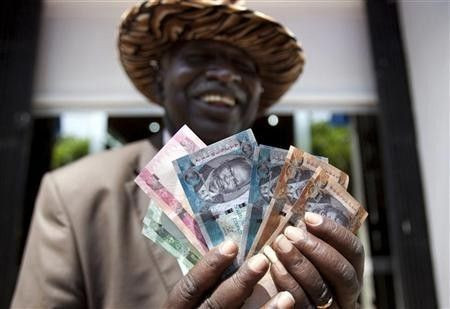South Sudan: Corruption Threatens Nascent Economy

According to the South Sudanese President Silva Kiir, 75 government officials have stolen a total of $4 billion of public money by skimming off oil revenue and through a 2009 scandal in which billions of dollars worth of grain were ordered but not delivered.
People in South Sudan are suffering and yet some government officials simply care about themselves, Kiir wrote in a letter sent to the officials last month.
Most of these funds have been taken out of the country and deposited in foreign accounts. Some have purchased properties, often paid in cash.
With oil production shut down due to a row with Sudan -- and no oil revenue sharing deal yet on the table for when production eventually restarts -- South Sudan is the midst of an economic crisis that corruption threatens to exacerbate. Moreover, corruption and a general lack of transparency have made the prospect of getting international loans a tricky business.
Taking on loans with a commitment to repay them in future oil production or revenues can be risky under the best circumstances, Dana Wilkins, a spokesperson for the anti-exploitation non-profit Global Witness, told AllAfrica in May. The risks of corruption and mismanagement are huge.
Corruption appears to be so deep in South Sudan that even top officials in the Anti-Corruption Commission have been accused of it. Earlier this year, allegations of nepotism and abuse of power were raised against former commission head Pauline Riak, and, according to the Sudan Tribune, her successor, Supreme Court judge John Gatwech Lul, was accused of conspiring against her.
Both have denied the charges outright, and no South Sudanese official has been prosecuted since the Sudan People's Liberation Movement came to power there in 2005.
We fought for freedom, justice and equality. Many of our friends died to achieve these objectives. Yet, once we got to power, we forgot what we fought for and began to enrich ourselves at the expense of our people, Kiir wrote in his letter to officials.
The credibility of our government is on the line.
South Sudan split from the north in last July, taking three-quarters of Sudan's oil fields with it. Before production shut down, oil accounted for 98 percent of government revenue in South Sudan, although the new nation was still one of the world's poorest and least developed.
In an attempt to alleviate the current financial burden, President Kiir is offering the 75 accused officials amnesty if they return the money, and also promised to keep their identities a secret.
But he has also sicced his watchdogs on officials and their foreign bank accounts. In late May, the six-year-old anti-corruption commission said it recovered $60 million of stolen government money during an operation that resulted in the dismissal of a number of government employees.
If anybody thinks he or she can take our money and run away with it they need to be told that this would not be possible, because we have closed all these doors, Lul, who became chair of the commission in 2011, said in a radio address.
This was why we went out to countries where money is stashed. We have gone to England. We have also gone to Switzerland and we have agreed with governments there to work together with us.
© Copyright IBTimes 2024. All rights reserved.





















